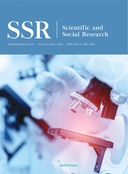Abstract
Optimizing the business environment is a new strategy for economic development which is placed by the Party Central Committee, and optimizing the business environment to improve the quality of economic development has gradually become an important task of the government. The construction of digital government is an important factor which is involved in the optimizing process, additionally has a significant impact on it. Therefore, it is essential to explore the impact, risks, and countermeasures of the construction of digital government in term of business environment optimizing.
References
Shi Y, Wang Y, 2022, Business Environment and Digital Transformation of Enterprises: Impact Performance and Mechanism of Action. Journal of Beijing Jiaotong University (Social Science Edition), 21(2): 14-28.
Chen T, Gao AL, 2021, Study on Optimizing Business Environment Driven by Digital Transformation of Government: The Case of Dongguan City. E-government, 2021(03): 83-93.
Song L, He C, 2018, The Logic and Promotion Path of the Reform of Management and Service under the Perspective of Optimizing Business Environment: An Analysis Based on the World Bank’s Business Environment Indicator System. China Administration, 2018(04): 67-72.
Xu J, Sha T, Business Environment, Technological Innovation and Total Factor Productivity, Research World, 1-9.
Xie Y, Wei J, Hao X, 2005, Research on Information Technology Barriers and their Countermeasures. Intelligence Theory and Practice, 2005(05): 557-560+556.
Lei H, Tang S, Sheng Y, et al., 2021, Process Digitization, Supply Chain Information Sharing and Firm Performance. Journal of Hunan University (Social Science Edition), 35(06): 67-79.
Peng H, 2022, The Logical Structure and Empowerment Boundaries of Data Tenure: A Perspective of “Tragedy of the Commons” and “Anti-Tragedy of the Commons”. Comparative Law Research, 2022(01): 101-115.
Han C, 2021, Optimizing Business Environment and Digital Government Construction. Journal of Shanghai Jiaotong University (Philosophy and Social Science Edition), 29(06): 31-39.
Huang W, 2022, The Disclosure of Enterprise Intellectual Property Information in the Context of Big Data. Journal of Shanxi University of Finance and Economics, 44(S1): 20-22.
Liu H, Cheng N, 2022, Study on the Multifaceted Challenges of Global Digital Governance and China’s Countermeasures. Northeast Asia Forum, 31(03): 19-28+127.
Ran X, Hu H, 2022, Urban-Rural Disparities, Digital Divide, and Health Inequalities in Old Age. Journal of Population, 44(03): 46-58.
Wang S, Ma R, 2022, The Construction of a Black-Box Regulatory System for Smart Investment Algorithms in the Context of Financial Data Security. Journal of Social Sciences, 2022(02): 86-95.
Xiao Y, Sheng Y, Tong B, 2020, Enterprise Reputation Management System Based on Enterprise Identification. Journal of System Science, 28(03): 76-79.
Patrick D, 2006, Big Era Governance: IT Corporations, the State, and E-Governance, London: Oxford University Press, 233.
Ding HM, 2018, Local Government Big Data Governance: Actions, Challenges, and Responses. Journal of Zhengzhou University (Philosophy and Social Science Edition), 51(01): 76-80.
Liu S, Liang J, Zhang Y, 2020, Research on the Prevention and Control of Bank Credit Risk under the Threshold of Big Data Technology. Guizhou Social Science, 2020(12): 121-128.
Lu S, Jing S, Sun Y, 2021, Collaborative Research on Government Services to Help Optimize the Business Environment. China Administration, 2021(08): 146-148.
Liu G, Liang H, 2019, Optimization of Business Environment from the Perspective of Externalities: A Study Based on the Demand-Oriented of Enterprises. China Administration, 2019(11): 52-59.
Dong KY, 2015, Five Key Points of Optimizing Government Services. Journal of the National School of Administration, 2015(04): 9-11.
Liu D, Dong B, Lu Y, 2021, Enterprise Code: A New Exploration of Government Digital Service Enterprises in a Double-Loop Pattern. E-Government, 2021(02): 53-63.
